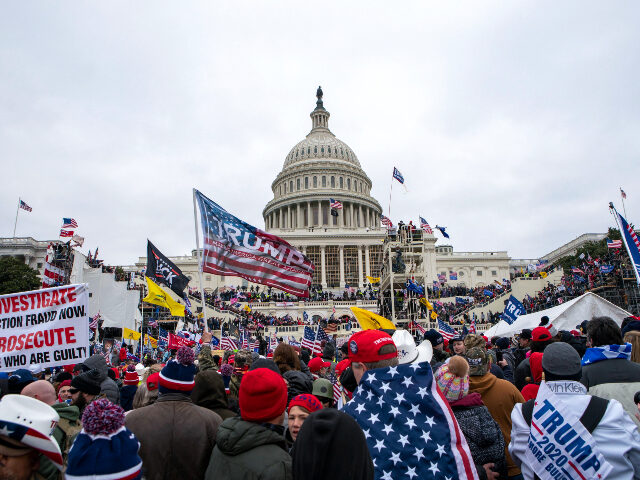The anti-Trump legal scholars who have argued that former President Donald Trump is barred from running for his old office by Section 3 of the Fourteenth Amendment have a slight problem: the text of the amendment itself.
As Breitbart News has reported, scholars who dislike Trump, both left and right, have argued that Trump is not allowed to run again because of the January 6 riot at the U.S. Capitol, which they insist was an “insurrection.”
Liberal legal scholar Jonathan Turley of George Washington University law school has written that the riot was not, in fact, an “insurrection,” and therefore the provisions of Section 3 do not apply to former President Trump.
Moreover, as Byron York of the Washington Examiner and others note, Section 3, which bans public office-holders who have engaged in “insurrection” from holding future office, appears to exclude the president and vice president.
Section 3 of the Fourteenth Amendment reads (emphasis added):
No person shall be a Senator or Representative in Congress, or elector of President and Vice President, or hold any office, civil or military, under the United States, or under any state, who, having previously taken an oath, as a member of Congress, or as an officer of the United States, or as a member of any state legislature, or as an executive or judicial officer of any state, to support the Constitution of the United States, shall have engaged in insurrection or rebellion against the same, or given aid or comfort to the enemies thereof. But Congress may by a vote of two-thirds of each House, remove such disability.
The text specifically lists “Senator,” Representative,” and “elector of President and Vice President,” but does not specifically mention the president or vice president. Some of those who advocate using Section 3 to disqualify Trump suggest that the president falls under the category of “any office.” Law professors William Baude and Michael Stokes Paulsen argue, for example, that the language of Section 3 must be interpreted broadly.
But there is also the legal convention of expressio unius est exclusio alterius (“the express mention of one thing excludes all others”), meaning that if a list omits something, it is presumed to have done so deliberately.
Joel B. Pollak is Senior Editor-at-Large at Breitbart News and the host of Breitbart News Sunday on Sirius XM Patriot on Sunday evenings from 7 p.m. to 10 p.m. ET (4 p.m. to 7 p.m. PT). He is the author of the new biography, Rhoda: ‘Comrade Kadalie, You Are Out of Order’. He is also the author of the recent e-book, Neither Free nor Fair: The 2020 U.S. Presidential Election. He is a winner of the 2018 Robert Novak Journalism Alumni Fellowship. Follow him on Twitter at @joelpollak.

COMMENTS
Please let us know if you're having issues with commenting.